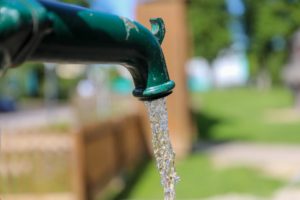WHAT IS THE EC?
The EC is the ability of a compound to conduct electricity from the amount of mineral salts that are dissolved in it. That is why controlling EC (electro-conductivity) of water is a very important factor to consider for any grower or gardener.
Conductivity measurements are used in many industrial and environmental applications to control dissolved content in different liquids. They are also widely used in many industries, such as controlling the quality of drinking water supplies, boiler water, hospitals and all industries that depend on water quality.
WHAT DOES TAP WATER CONTAIN?
Tap water contains a multitude of elements, mineral salts, heavy metals (lead, zinc, boron) and different chemicals such as chlorine; if the plumbing facilities are also old, it is very likely that it will also contain traces of accumulated lime or oxides and sediments. Chlorine is used to kill all kinds of microorganisms, fungi, bacteria, pathogens and prevents the appearance of mold in stagnant waters. Removing chlorine from water is as important as lowering EC.
The quality of the drinking water of the place to which we have access to the network is such a determining factor that many companies take into account a careful choice of the location chosen when building or opening a new headquarters. If companies and multinationals look so much on water quality, why not do all growers and gardeners?

Tap water
HARDNESS OF THE WATER
Depending on the concentration of mineral salts dissolved in the water, we will distinguish between soft and hard water. The main difference between what we call soft and hard water is that in the latter there is a high concentration of calcium ions (Ca2) and magnesium (Mg2) dissolved.
Soft water is called those whose measurements do not exceed a range of 70-150ppm while hard water is those whose range ranges from 320-420ppm.
Depending on the geographical area in which we are, we will have access to one type of water or another since not all places use the same techniques for water treatment. In addition, widespread rises in temperatures in summer seasons stimulate the proliferation and reproduction of fungi, parasites and microbes, causing chlorine doses in the drinking water network to also be higher during these dates.
HOW CAN WE MEASURE EC?
There are different types of EC measuring instruments available in the market, with a wide range of prices, all of them valid and functional, depending on the decimals we want you to show us. There are also those that perform different functions, as well as measure pH and temperature (so-called combos) on a constant basis, mandatory for use through the different hydroponic techniques.
MEASURING UNITS
The conductivity of water is measured within a certain distance, so although the one used in the SI is that of S (Siemens) they are usually expressed as S/cm or mS/cm.
We can also find other units of measurement such as ppm (part per million) and TDS (total dissolved solids). The relationship between conductivity and dissolved solids is given by the following equalities:
2 μS/cm = 1 PPM
1 PPM = 640 TDS
BENEFITS OF LOWERING THE EC FROM WATER
The goal is to start with a base water as pure as possible, better if it is 000ppm, in order to obtain the following benefits:
Know at all times which additives and in what quantities will be added.
We will increase the bioavailability of the plant causing greater efficiency of the fertilizers, making them can be absorbed optimally.
Protect, maintain and enhance the use of organic fertilizers, microbial life and beneficial microorganisms.
If we want to prepare a calcium and magnesium base water with an EC of 0.3-0.4, we will have greater control over the necessary amounts.
It allows us to identify in advance the possible symptoms of deficiencies and / or excess nutrients in our plants.
It helps us protect the roots by fortifying the immune system against possible pests and diseases.
It helps to stabilize pH.
Advance collection time and increase production.
Get a quality end product.
With GrowMax Water reverse osmosis system we obtain pure water, eliminating chlorine and helping lower EC by up to 95% the content of mineral salts, heavy metals, herbicides, pesticides and sediments. We also have the 000ppm range to create ultra pure water, ideal for small and medium growers who want to obtain clean and quality water.


